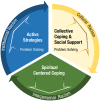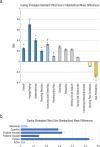A Systematic Review of Black People Coping With Racism: Approaches, Analysis, and Empowerment
- PMID: 36006823
- PMCID: PMC10018067
- DOI: 10.1177/17456916221100509
A Systematic Review of Black People Coping With Racism: Approaches, Analysis, and Empowerment
Abstract
This article reviews the current research literature concerning Black people in Western societies to better understand how they regulate their emotions when coping with racism, which coping strategies they use, and which strategies are functional for well-being. A systematic review of the literature was conducted, and 26 studies were identified on the basis of a comprehensive search of multiple databases and reference sections of relevant articles. Studies were quantitative and qualitative, and all articles located were from the United States or Canada. Findings demonstrate that Black people tend to cope with racism through social support (friends, family, support groups), religion (prayer, church, spirituality), avoidance (attempting to avoid stressors), and problem-focused coping (confronting the situation directly). Findings suggest gender differences in coping strategies. We also explore the relationship between coping with physical versus emotional pain and contrast functional versus dysfunctional coping approaches, underscoring the importance of encouraging personal empowerment to promote psychological well-being. Findings may help inform mental-health interventions. Limitations include the high number of American-based samples and exclusion of other Black ethnic and national groups, which is an important area for further exploration.
Keywords: Black people; coping; emotion regulation; racial discrimination; racism.
Conflict of interest statement
The author(s) declared that there were no conflicts of interest with respect to the authorship or the publication of this article.
Figures



References
Publication types
MeSH terms
Grants and funding
LinkOut - more resources
Full Text Sources

